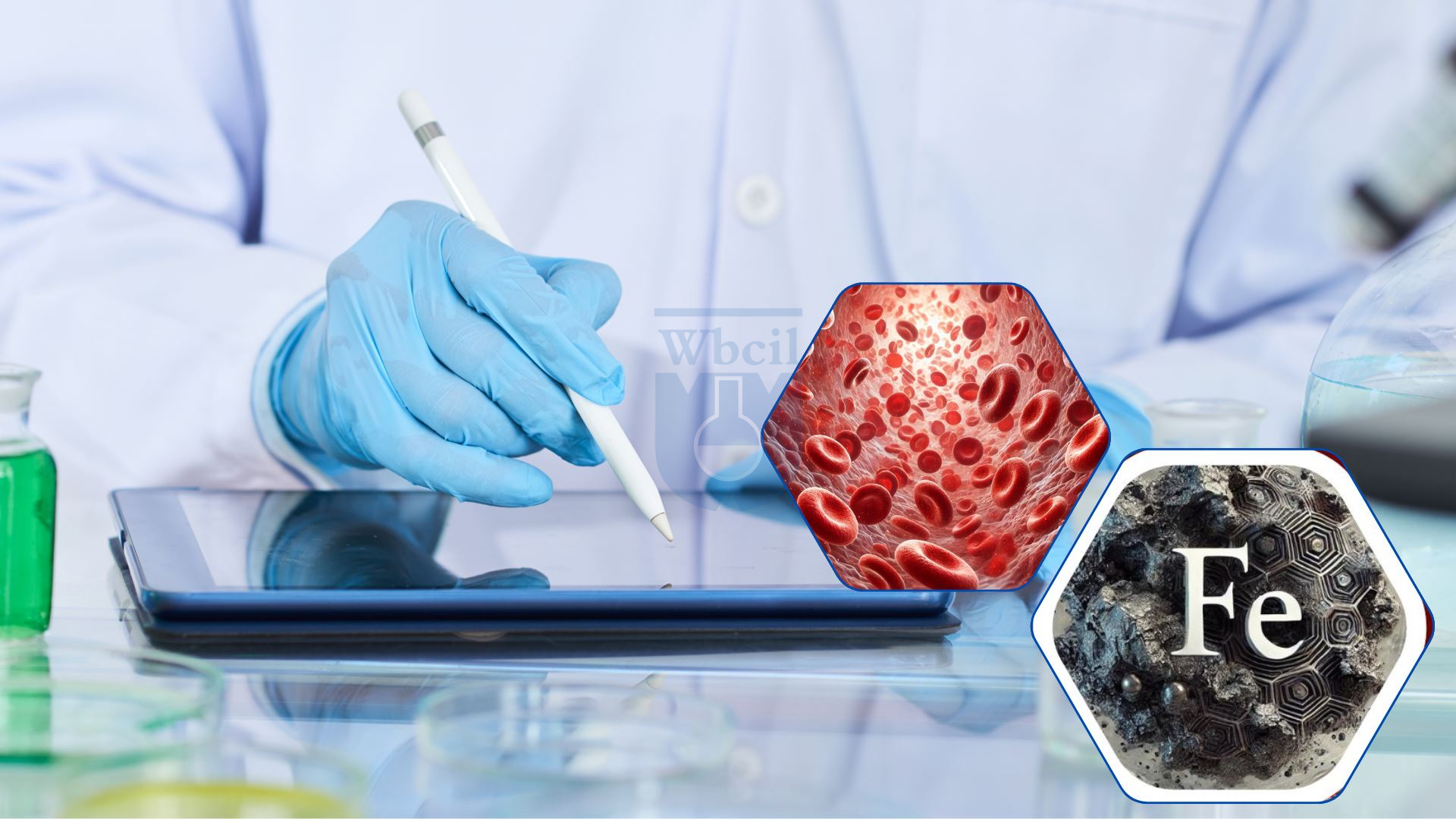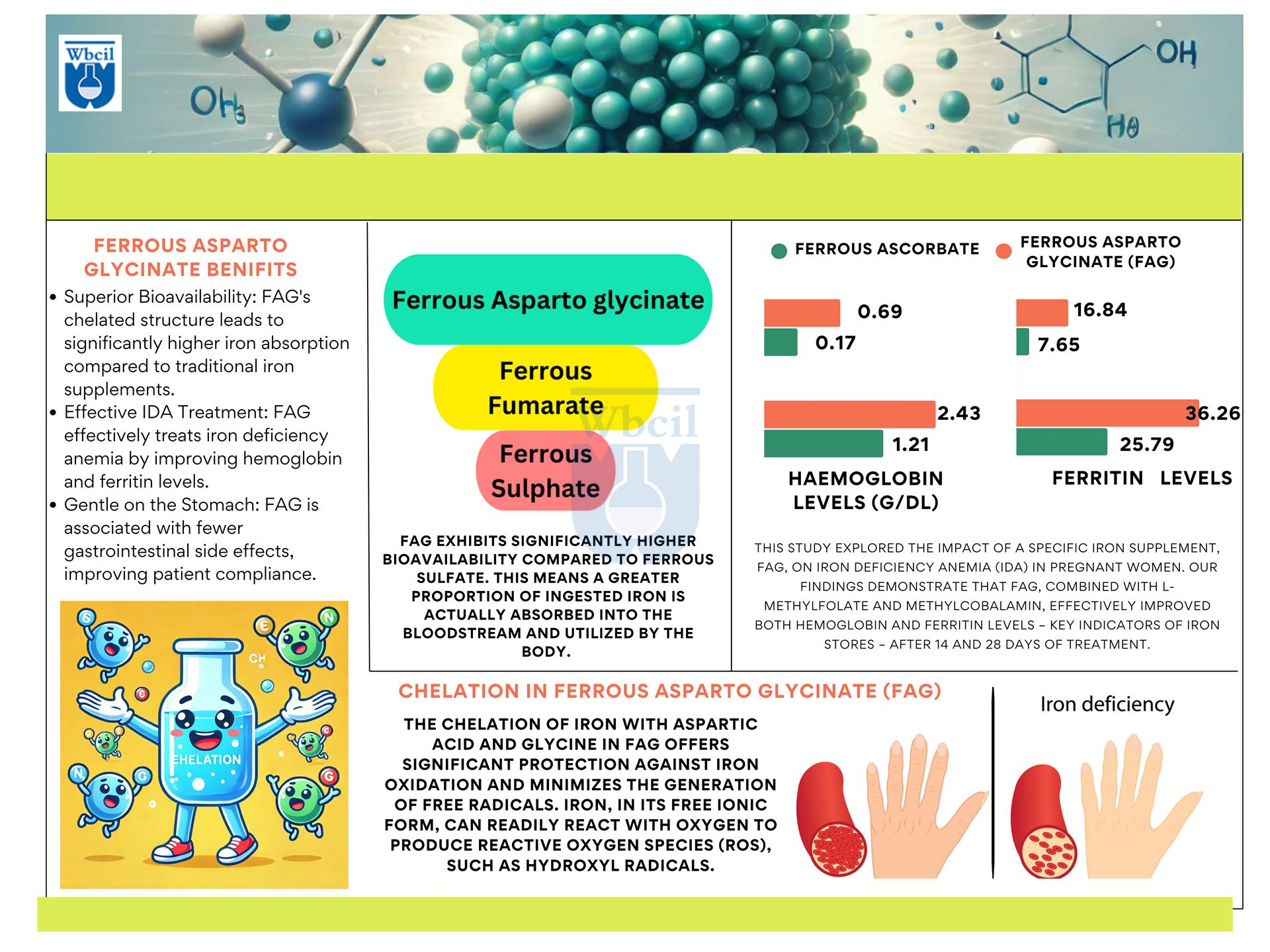Iron Deficiency Got You Down? Exploring the Science of Ferrous Asparto Glycinate
Iron deficiency -it’s more than just feeling tired. It’s a widespread health issue that can impact everything from energy levels and cognitive function to immune health. And while iron supplements are a common solution, traditional options often come with a hefty side of gastrointestinal distress. This is where the science of iron chelation and compounds like Ferrous Asparto Glycinate (FAG) offer a new perspective. Let’s delve into the clinical and pharmaceutical facts behind this promising approach the iron chelate – ferrous asparto glycinate.
The Iron Deficiency Challenge: Beyond the Tiredness
Iron is a critical component of hemoglobin, the protein in red blood cells responsible for oxygen transport. It’s also essential for various enzymatic processes, including energy production and DNA synthesis. Iron deficiency anemia (IDA) arises when iron stores are depleted, leading to reduced hemoglobin synthesis and a cascade of symptoms like fatigue, weakness, shortness of breath, and impaired cognitive function.
Traditional iron salts, such as ferrous sulfate, are frequently prescribed, but their low bioavailability and propensity for gastrointestinal side effects (nausea, constipation, abdominal pain) often hinder patient compliance and treatment success.

Iron Chelation: A Targeted Approach
Iron chelation involves binding iron to organic molecules (ligands) to form a stable complex iron chelates. This process enhances iron solubility, protects it from oxidation, and facilitates its transport across the intestinal lining. Think of it as a sophisticated delivery system for iron. Ferrous Asparto Glycinate (FAG) is a chelated iron compound gaining attention for its improved absorption and tolerability.
How does Ferrous Asparto Glycinate improve iron absorption?
Ferrous Asparto Glycinate Benifits
FAG’s unique structure, combining iron with the amino acid’s aspartic acid and glycine into iron chelates, contributes to its favorable properties:
Best iron supplement with high bioavailability of ferrous asparto glycinate
Studies suggest that significantly higher bioavailability in human nutrition is observed in Ferrous Asparto Glycinate vs Ferrous Sulfate. This means a greater proportion of ingested iron in human nutrition is actually absorbed into the bloodstream and utilized by the body [1]. This enhanced absorption is likely due to the chelate structure protecting the iron from interactions with other dietary components and facilitating its transport across the intestinal mucosa.
Reduced Gastrointestinal Side Effects: Clinical trials have demonstrated a lower incidence of iron supplement side effects with FAG compared to traditional iron supplements. This improved tolerability is crucial for patient adherence to treatment and long-term success. The chelated structure minimizes the direct contact of iron with the gastrointestinal lining, reducing the likelihood of irritation and oxidative stress.
Targeted Delivery: The amino acid ligands in FAG may play a role in actively transporting iron across the intestinal cells, further enhancing its absorption.
Comparative Bioavailability of Ferrous Asparto Glycinate vs. Ferrous Sulfate: Why is Ferrous Asparto Glycinate better than ferrous sulfate?
Iron bioavailability, the amount of iron your body can actually use, differs significantly between iron supplements. Chelated iron supplement, like ferrous asparto glycinate and ferrous bisglycinate, boasts higher bioavailability due to its binding with amino acids.
This chelation protects iron from dietary inhibitors, improving absorption. Ferrous ascorbate, while not chelated iron suppliment, combines iron with vitamin C, which enhances iron’s solubility and absorption in the gut. Conversely, ferrous fumarate, a non-chelated salt, typically exhibits lower bioavailability due to its susceptibility to interactions with dietary components.
Choosing the right iron supplement is crucial for optimal iron levels. Beyond bioavailability, Iron Supplement side effects also vary. Chelated iron supplement often leads to fewer gastrointestinal issues compared to non-chelated forms.
While ferrous ascorbate is generally well-tolerated, some individuals may experience discomfort. Ferrous fumarate, potentially requiring higher doses due to lower bioavailability, may be more prone to causing side effects like nausea or constipation. Therefore, when selecting an iron supplement, consider both bioavailability and potential side effects for the best outcome.
Mechanisms Underlying Enhanced Ferrous Asparto Glycinate (FAG) Absorption
The superior bioavailability and tolerability of FAG compared to traditional iron salts are attributable to its unique chelated structure and the specific mechanisms governing its absorption and ferrous asparto glycinate benefits [2]. Two primary factors contribute to this enhanced performance: facilitated transport and oxidative stress mitigation.

How does aspartic acid help in iron absorption?
Aspartic acid, a component of the FAG chelate, plays a crucial role in facilitating iron transport and oxygen delivery across the intestinal epithelial cells. While the precise mechanisms are still under investigation, several hypotheses exist. One possibility involves the interaction of the FAG chelate with specific transporters on the apical membrane of intestinal cells. Aspartic acid, being a dicarboxylic amino acid, may enhance the binding affinity of the chelate to these transporters.
Alternatively, the chelate may be internalized via a mechanism involving endocytosis, where the aspartic acid moiety interacts with receptors on the cell surface, triggering the invagination of the membrane and the subsequent uptake of the chelate.
Once inside the enterocyte, the iron is released from the chelate and transported to the basolateral membrane for release into the bloodstream. Further research is needed to fully elucidate the specific transporters and pathways involved in this process.
Can Ferrous Asparto Glycinate reduce oxidative stress?
The chelation of iron with aspartic acid and glycine in FAG offers significant protection against iron oxidation and minimizes the generation of free radicals leading to better iron absorption efficiency. Iron, in its free ionic form, can readily react with oxygen to produce reactive oxygen species (ROS), such as hydroxyl radicals.
These ROS can damage cellular components, including lipids, proteins, and DNA, contributing to gastrointestinal irritation and potentially systemic oxidative stress & iron metabolism. Chelation therapy effectively shields the iron atom, preventing it from participating in redox reactions and thus reducing ROS production. 2
This protective effect is particularly important in the context of iron supplementation, as high doses of inorganic iron salts can overwhelm the body’s antioxidant defenses and lead to oxidative damage. By minimizing ROS generation, FAG contributes to its improved tolerability profile and reduces the risk of gastrointestinal side effects and the iron absorption efficiency is increased.
Furthermore, the chelated structure enhances iron’s stability in the varying pH environment of the digestive tract, preventing premature release of iron and minimizing its interaction with other dietary components that could hinder absorption.
This combined effect of enhanced solubility and reduced oxidative stress contributes significantly to superior tolerability and bioavailability of ferrous asparto glycinate.
Ferrous Asparto Glycinate dosage for anemia
The dosage of Ferrous Asparto Glycinate for anemia should be determined by a healthcare professional based on the individual’s specific needs and medical condition. Generally, the recommended dosage for adults is 100 mg per day, taken orally with food. However, this may vary depending on the severity of the anemia and other factors. It is important to follow the healthcare professional’s instructions carefully and not exceed the recommended dosage.
Is Ferrous Asparto Glycinate safe for long-term use?
Ferrous Asparto Glycinate is generally considered safe for long-term use, especially when taken as directed by a healthcare professional. However, it is important to be aware of the potential risks associated with long-term iron supplementation. These risks include iron overload, which can damage organs and tissues [3].
It is important to monitor iron levels regularly and adjust the dosage as needed to avoid iron overload. Additionally, some people may experience side effects such as nausea, constipation, or diarrhea, even with long-term use. 2 If you experience any persistent or bothersome side effects, it is important to consult with your healthcare professional.
Implications for Specific Populations
Ferrous Asparto Glycinate for pregnant women
Pregnancy often brings about anemia, a frequent blood disorder. Hemoglobin and ferritin levels naturally decline as pregnancy progresses, especially between the 12th and 16th weeks (Xiao et al. 2002; Asif et al. 2007).
Consequently, iron supplements are often recommended to help expectant mothers maintain healthy levels of these vital components (Meier et al. 2003). This study explored the impact of a specific iron supplement, FAG, on iron deficiency anemia (IDA) in pregnant women.
Our findings demonstrate that FAG, combined with L-methylfolate and methylcobalamin, effectively improved both hemoglobin and ferritin levels – key indicators of iron stores – after 14 and 28 days of treatment. Furthermore, FAG proved more effective than ferrous ascorbate in addressing IDA [4].
Given these results, FAG, enhanced with L-methylfolate and methylcobalamin, appears to be a promising option for managing IDA during pregnancy, exhibiting superior improvements in hemoglobin and ferritin with minimal gastrointestinal side effects compared to ferrous ascorbate.
1. https://go.drugbank.com/drugs/DB11169
2. Kamdi SP, Palkar PJ. Efficacy and safety of ferrous asparto glycinate in the management of iron deficiency anaemia in pregnant women. J Obstet Gynaecol. 2015 Jan;35(1):4-8. doi: 10.3109/01443615.2014.930098. Epub 2014 Jun 24. PMID: 24959663. https://pubmed.ncbi.nlm.nih.gov/24959663/
3. https://www.webmd.com/drugs/2/drug-166487/prenate-dha-ferrous-asparto-glycinate-oral/details
4. National Center for Biotechnology Information. PubChem Compound Summary for CID 73415801, Ferrous asparto glycinate. https://pubchem.ncbi.nlm.nih.gov/compound/Ferrous-asparto-glycinate. Accessed Feb. 17, 2025.
Ferrous Asparto Glycinate (FAG) is a chelated iron supplement where iron is bound to the amino acids aspartic acid and glycine. This chelation enhances iron absorption efficiency, reduces gastrointestinal side effects, and improves bioavailability compared to traditional iron salts like ferrous sulfate.
Unlike inorganic iron salts, Ferrous Asparto Glycinate bypasses common absorption barriers by:
- Chelating iron with amino acids for better solubility and faster uptake in the intestines.
- Protecting iron from dietary inhibitors (e.g., phytates, tannins) that block iron absorption.
- Delivering iron in a stable, non-oxidative form, preventing digestive irritation.
Ferrous Asparto Glycinate vs. Ferrous Sulfate comparison:
| Feature | Ferrous Asparto Glycinate | Ferrous Sulfate |
| Bioavailability | Higher (60-80%) | Lower (20-30%) |
| Gastrointestinal Side Effects | Minimal | Common (nausea, constipation, bloating) |
| Absorption Mechanism | Chelated for direct uptake | Requires conversion in the gut |
| Tolerance | Highly tolerable | Can cause oxidative stress |
Yes, Ferrous Asparto Glycinate is generally safe for long-term use when taken in recommended dosages. Unlike traditional iron supplements, it does not cause iron overload or oxidative stress due to its controlled absorption mechanism.
Traditional iron salts can generate free radicals that lead to oxidative damage in the intestines. However, Ferrous Asparto Glycinate reduces reactive oxygen species (ROS), minimizing inflammation and gut irritation.
- Adults: 100 mg daily, preferably with meals.
- Pregnant Women: 50-100 mg/day, as advised by a healthcare provider.
- Children: Based on body weight, under medical supervision.
Pregnant women often experience iron deficiency anemia (IDA) due to increased blood volume and fetal iron demands. Ferrous Asparto Glycinate:
- Boosts hemoglobin and ferritin levels faster than ferrous ascorbate.
- Reduces nausea and constipation, making it better tolerated than ferrous sulfate.
- Supports fetal development by providing steady iron metabolism without causing oxidative stress.
Yes! Postmenopausal women often develop low iron stores due to decreased dietary intake. Ferrous Asparto Glycinate:
- Restores optimal iron levels without causing stomach upset.
- Enhances cognitive function and reduces fatigue in postmenopausal women.
Yes! Athletes lose iron through sweat, muscle breakdown, and increased metabolism. Ferrous Asparto Glycinate:
- Improves oxygen transport for better endurance and performance.
- Reduces exercise-induced fatigue by replenishing iron stores efficiently.
- Prevents anemia-related weakness in endurance sports.
Leading manufacturers like West Bengal Chemical Industries (WBCIL) produce high-purity, GMP-certified Ferrous Asparto Glycinate APIs for:
- Pharmaceutical & nutraceutical companies
- Iron-fortified food & supplement brands
- Global healthcare providers
